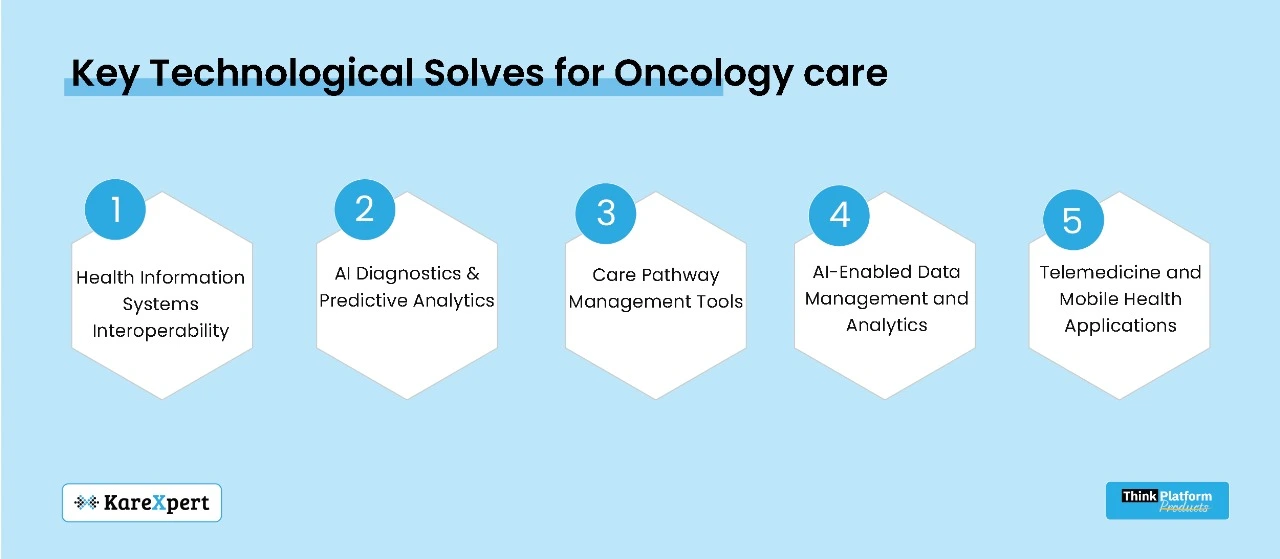Bridging the Gaps: How Technology is Revolutionizing Coordinated Cancer Care

The field of oncology care is a vast and extensive area that encompasses various specialties, treatments, and ongoing monitoring, all of which demand coordination among healthcare providers. Good coordination is essential to achieve the best treatment outcomes in cancer care. However, providing an integrated approach to oncology care is challenging. These challenges often stem from fragmented communication, delayed diagnosis, and the difficulties associated with managing vast amounts of patient data.
The good news is that technology-driven options are emerging to alleviate these burdens and improve oncology care. In this blog, we explore some of the main challenges in coordinated oncology care and discuss how technology is helping to address these problems.

Challenge #1: Breakdown in Communication Between Providers
Silos in communication remain one of the largest challenges to coordinated oncology care. Oncology patients typically receive care from multiple providers such as oncologists, radiologists, surgeons, and primary care doctors. Unfortunately, these providers often use separate systems and communicate through different channels, which can result in delays and incomplete information sharing.
Technological Fix: Health Information Systems Interoperability
Technology offers solutions such as integrated health information systems (e.g., Electronic Medical Records (EMR) and Electronic Health Records (EHR)). These systems allow all stakeholders to update and share patient information in real-time. For example, platforms like KareXpert’s Healthcare Symphony provide an AI-driven platform for seamless communication between departments, ensuring that all providers have access to complete patient data, leading to faster, more informed treatment decisions.
Secure video conferencing and messaging platforms have also enabled rapid consultations with specialists, overcoming geographic barriers and allowing for real-time decision-making.
Challenge #2: Late Diagnosis and Treatment
Cancer is time-sensitive, and early detection is crucial for effective treatment. However, patients often experience delays due to scheduling conflicts, long wait times for diagnostic tests, and inefficient referral systems. For cancer patients, such delays can mean the disease progresses further before treatment begins.
Technological Fix: AI Diagnostics & Predictive Analytics
Technologies like Artificial Intelligence (AI) and predictive analytics are transforming oncology care. AI diagnostic tools can analyze imaging scans, blood tests, or genetic tests to identify cancer earlier, potentially even before symptoms appear. Predictive analytics can also help forecast patient outcomes, enabling healthcare providers to prioritize high-risk patients and allocate resources more effectively.
Telemedicine platforms facilitate specialty consultations without the need for patients to travel, particularly in underserved or rural areas.
Challenge #3: Complex, Interdisciplinary Treatment Plans
Oncology care often involves multimodal treatment plans, including surgery, chemotherapy, radiation therapy, immunotherapy, and palliative care. Coordinating care across multiple disciplines can be logistically challenging, and patients may experience delays in transitioning between treatments.
Technological Fix: Care Pathway Management Tools
Care pathway management tools help streamline coordination in oncology care by mapping out treatment plans and detailing the role of each specialist. These tools ensure that everyone involved in the patient’s care has a clear understanding of the treatment sequence, minimizing delays and enhancing care transitions. Platforms like KareXpert allow healthcare providers to monitor and manage every step of a patient’s treatment journey in one integrated system.
Challenge #4: Managing Patient Data
Cancer care generates large volumes of data, including imaging results, pathology reports, genetic profiles, and treatment histories. Managing and interpreting this data can be overwhelming for both patients and providers. Additionally, patient information is often siloed across disparate databases, preventing providers from seeing the complete picture.
Technological Fix: AI-Enabled Data Management and Analytics
AI-powered data management platforms can aggregate vast amounts of patient data, making it easier for healthcare providers to access and analyze the information. These platforms provide a “single source of truth” for all patient records, allowing providers to make data-driven decisions quickly and efficiently. AI analytics can also help identify patterns in patient responses to treatment, allowing for more personalized and effective care.
Challenge #5: Patient Engagement and Treatment Adherence
Patient adherence to treatment is critical in cancer care, but patients often struggle to follow complex treatment regimens due to side effects, emotional distress, or logistical challenges. Non-adherence can lead to poorer outcomes and higher relapse rates.
Technological Fix: Telemedicine and Mobile Health Applications
Telemedicine platforms and mobile health apps can help cancer patients stay connected with their healthcare providers. These tools enable patients to schedule virtual follow-up appointments, receive reminders for medication, and track their symptoms in real time. Telemedicine also provides emotional support and counseling, helping to alleviate the psychological burden of cancer treatment.
Mobile apps with symptom-tracking capabilities allow patients to report side effects to their healthcare providers, enabling timely interventions to keep treatment on track.
Conclusion
Oncology care presents numerous coordination challenges, including communication breakdowns, delayed diagnosis, complex treatment plans, and overwhelming amounts of data. However, technology is offering solutions that optimize care delivery, improve patient outcomes, and reduce the burden on healthcare providers.
The future of oncology care involves AI-powered diagnostics, care pathway management tools, integrated health information systems, and telemedicine platforms—all working together to create a more coordinated, efficient, and patient-centered approach to cancer care.
